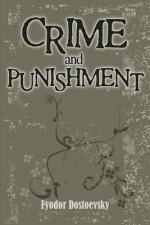|
This section contains 1,072 words (approx. 3 pages at 400 words per page) |

|
Guilt and Innocence
In large part, Crime and Punishment is an examination of the guilty conscience. For Dostoyevsky, punishment is not a physical action or condition. Rather (much as in Milton's epic poem Paradise Lost), punishment inherently results from an awareness of guilt. Guilt is the knowledge that one has done wrong and has become estranged from society and from God. From the very beginning of the novel, Raskolnikov (whose name derives from the Russian word for "schism") suffers from this estrangement. In murdering the pawnbroker, he seeks to prove that he is above the law. But his crime only reinforces his sense that he is not a part of society.
Although she is a prostitute, Sonya is the embodiment of innocence. Her motive in becoming a prostitute was not one of lust. Indeed, in all of the novel, there is no indication that Sonya has any lustful or...
|
This section contains 1,072 words (approx. 3 pages at 400 words per page) |

|




